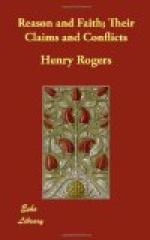The above examples are fair illustrations, we venture to think, of the conditions under which we are required to believe the far higher truths, attended no doubt with great difficulties, which are authenticated in the pages of the two volumes (Nature and Scripture) which God has put into our hands to study; of the conditions to which He subjects us in training us for a future state, and developing in us the twofold perfection involved in the words ‘a reasonable faith.’ If the considerations just urged were duly borne in mind, we cannot help thinking that they would afford (where any modesty remained) all answer to most of those forms of unbelief which, from time to time, rise up in the world, and not least in our own day. These are usually founded on one or more supposed insoluble objections, arising out of our ignorance. The probability that they are incapable of solution is rashly assumed, and made to overbear the far stronger probability arising from the positive and appreciable evidence which substantiates the truths involved in those difficulties: a course the more unreasonable inasmuch as—first, many such difficulties might be expected; and, secondly, in analogous cases, we see that many such difficulties have in time disappeared. On the other hand, it is, no doubt much more easy to insist on individual objections, which no man can effectually answer, than it is to appreciate at once the total effect of many lines of argument, and many sources of evidence, all bearing on one point. That difficulty was long ago beautifully stated by Butler*, in a passage well worthy of the reader’s perusal; and as Pascal had observed before him, not only is it difficult, but impossible, for the human mind to retain the impression of a large combination of evidence, even if it could for a moment fully realise the collective effect of the whole. But it cannot do even this, any more than the eye can take in at once, in mass and detail, the objects of an extensive landscape. ____
* ’The truth of our religion, like the truth of common matters, is to be judged of by all the evidence taken together. And, unless the whole series of things which may be alleged in this argument, and every particular thing in it, can reasonably be supposing to have been by accident (for here the stress of the argument of Christianity lies), then is the truth of it proved. . . . It is obvious how much advantage the nature of this evidence gives to those persons who attack Christianity, especially in conversation. For it is easy to show in a short and lively manner that such and such things are liable to objection, but impossible to show, in like manner, the united force of the whole argument in one view.’—Analogy, part ii. chap. vii. ____
Let us now be permitted briefly to apply the preceding principles to two of the greatest controversies which have exercised the minds of men; that which relates to the existence of God, and that which relates to the truth of Christianity; in both of which, if we mistake not, man’s position is precisely similar—placed, that is, amidst evidence abundantly sufficient to justify his reasonable faith, and yet attended with difficulties abundantly sufficient to baffle an indocile reason.




